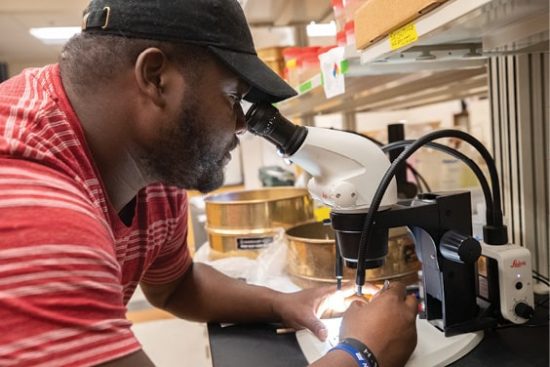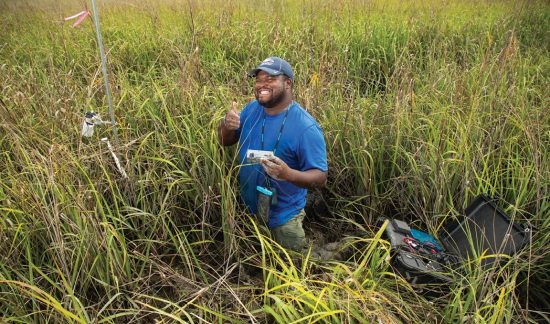Alex Troutman
Conservation Biology Is For Everyone

As an undergraduate, Alex Troutman (‘14) was unsure of his future career field. Little did he know that professors Ray Chandler, Ph.D., and Michelle Cawthorn, Ph.D., would have an impact on his destiny. Through field experiences in their classes, he discovered what it was like to be a wildlife biologist.
“When I first came to Georgia Southern, I was thinking about becoming a veterinarian, and then later considered teaching,” he said. “But then I had experience in the field with Dr. Chandler’s ornithology class and Dr. Cawthorn’s mammalogy class, and those two classes made me realize that wildlife biology is definitely my passion.”
A native of Austell, Georgia, Troutman received his undergraduate degree in biology from Georgia Southern University. After graduation, he started his career as a conservation biologist, specializing in marine biology. He went to work with ZooAtlanta, Georgia Aquarium, the U.S. Fish and Wildlife Service and the National Park Service.
GRADUATE SCHOOL CHOICE
He was considering a different graduate school when he stopped in to meet with Professor Checo Colon Gaud, Ph.D., who asked him to apply to Georgia Southern.
“Dr. Checo understands what it takes as an underrepresented scientist to make it through academia,” said Troutman. “And also he has some of the same life experiences as I do, being a minority in a predominantly white field. That was one of the reasons I chose to come back to Georgia Southern, for him to lead me and guide me through this process.”
Troutman told Colon Gaud he would apply to Georgia Southern, but he still wasn’t sure and kept stalling.
“I was out in the Gulf of Mexico on a dredging ship working as an endangered species observer for a consulting firm,” said Troutman. “And Dr. Checo emailed me and he said, ‘Hey, are you going to apply?’”
So Troutman quickly applied to the Master of Science in Biology program and received a teaching assistantship.
SEARCHING FOR FUNDING

His teaching assistantship provided funding for spring and fall semesters. But Troutman had to secure additional funding for the summer. In the summer months, Troutman focused his research on the diet of the seaside sparrow, a bird that lives in the tidal salt marshes, a semi-marine area, off the coast of Georgia.
To obtain funding for his research, he received an award from the Georgia Ornithological Society and won a very competitive fellowship with the Safina Center.
“Carl Safina is a writer and ecologist. He has a foundation that awarded me funding to do some of my research, but also to engage in community outreach,” said Troutman. “I’m trying to be the representation that I didn’t have as a young ‘wannabe scientist’ growing up. I loved guys like Steve Irwin and Jeff Corwin, but those guys didn’t look like me. There wasn’t any representation of anybody who looked like me doing wildlife biology and being a conservationist.”
SCIENCE FOR EVERYBODY

The science field in general is lacking in diversity, especially in the natural resources and outdoor fields. Troutman uses his #BlackAFinSTEM collective work, Black In Marine Science, Black Birder’s week and other Black In ‘X’ weeks to promote science for everybody. Most importantly, his selection as an early-career fellow with the Safina Center focuses on his ability to engage and encourage people of color and people of lower socioeconomic status to get involved in nature and the outdoors.
“So, Black In Marine Science came about to showcase and amplify black marine scientists’ voices,” said Troutman. “We also want to encourage the younger generation to pursue marine science.”
Troutman designs and holds science programs for young people in person and online. He introduces natural resources and the outdoors to children that normally don’t have access to this kind of learning.
“Now, we have different programs like BIMS TV, which is Black In Marine Science TV,” said Troutman. “And we do small little snippets of programs that are for kids (BIMS Kids) and also the general public (BIMS Bites), where we break down marine science topics into bite-sized, understandable bits.”
After Troutman graduates in 2022, one of his future goals is to create a nonprofit organization specializing in bridging the gap into the natural resources field for people of color, and socioeconomically disadvantaged children. Troutman wants to contribute to the representation of that key demographic missing in the scientific field.
“The STEM Field should not just be geared toward the success of one particular people group,” said Troutman. “It should be geared toward success for everyone, Black, brown, white, anybody should be able to enjoy the outdoor STEM fields. We want to promote that everyone should be able to pursue any field they want to.”
— Liz Walker
